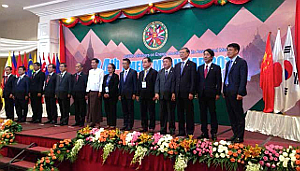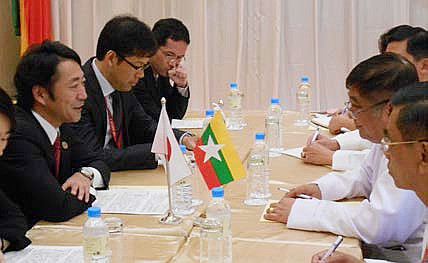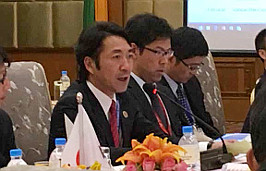Cabinet Secretariat [Monday, Sep 26, 2016]
Policy Speech by Prime Minister to the 192th Session of the Diet
1. Introduction
The determination to be the world’s number one.
At the Rio 2016 Olympic Games, at which Japan won the largest number of medals in its history, everybody in Japan was moved by our athletes, who competed head-on with the world’s best athletes and refused to give up until the very last moment.
We must make the 2020 Tokyo Olympic and Paralympic Games four years from now the best the world has seen. We must make them successful by any means possible. At the same time, we are pioneering the future of our country. This is the opportunity for us, too, to start anew with the goal of making Japan the best country in the world to live in, and the most trusted country in the world.
The Liberal Democratic Party of Japan and Komeito, the government ruling coalition parties, were able to secure a victory well above the goal of a majority of the seats up for election in the House of Councillors election.
“Proceed powerfully down this road”
This is the will of the Japanese people as expressed through the election. We will produce steady results on the basis of a stable political foundation. We are determined to respond to the mandate of the Japanese people.
What is required in this Diet is that we do not turn our backs on the issues at hand, but rather issue a challenge to them. We must tackle the most difficult of issues, engage in constructive debate, and produce results.
The dynamic engagement of all citizens, vitalizing local economies, a new era of agricultural policies, and diplomacy that takes a panoramic perspective of the world map: the Abe Cabinet will continue its challenge towards the future. Together, let us pioneer the future of a Japan that shines at the center of the world.
2. Disaster Recovery and Reconstruction
This summer, Japan was hit with a series of record-breaking heavy rains, including Typhoon No. 10. I would like to offer my prayers for the repose of the souls of those who lost their lives and also extend my sympathies to all those affected by this disaster. Significant damage was caused to lifestyle infrastructure, crops about to be harvested and others, mainly in Hokkaido and the Tohoku region, but elsewhere as well. We will do everything within our power for the recovery from this “Disaster of Extreme Severity.” We will undertake further measures for disaster prevention and mitigation, and promote national resilience.
Five months have passed since the Kumamoto Earthquake. The move to temporary housing is all but complete, and we will accelerate the rebuilding of people’s lives in the disaster areas by such means as the construction of public housing for disaster-stricken households and the restoration of daycares and nursing care facilities. We will move forward with the restoration of livelihoods by supporting the reopening of businesses by small and medium enterprises, and people in the agriculture, forestry and fishery industries. We will reduce the fiscal burden on local governments in the disaster areas by increasing the special local grant tax. We are undertaking these initiatives with the aim of achieving the quickest possible recovery.
Last year, more foreign visitors stayed overnight in the Tohoku region than before the Great East Japan Earthquake. We will support new pioneering efforts, with the goal of making Tohoku a tourism leader. In Fukushima Prefecture, we will further promote the accumulation of new industries as the “land of pioneers” for the future of energy in society while steadily moving forward with the establishment of an environment that enables the return of the residents, including the construction of interim storage facilities and decontamination, as well as measures for decommissioning and contaminated water issues.
We will pioneer a new future for the Tohoku region, working together with the people in the disaster areas with the memories of the difficult times of the Great East Japan Earthquake etched into our hearts.
3. Accelerating Abenomics
(International coordination)
The U.K. exit from the EU, the stalling of the emerging economies: The world economy is currently facing major risks.
At the Ise-Shima Summit, G7 member countries agreed to take all appropriate policy responses in order to avoid falling into another crisis. The G7 consulted closely and acted swiftly when the U.K. decided to exit from the EU.
At the recent G20, we shared this sense of crisis with China and other emerging economies. We will exercise further leadership to strengthen international coordination for the purpose of the growth of the world economy and market stability.
(Mobilizing all policy measures)
Japan will fulfill its responsibilities as the country holding the G7 presidency. We will mobilize all policies. We will powerfully support domestic demand by executing economic measures exceeding 28 trillion yen in project scope. We will further accelerate Abenomics and achieve maximum escape velocity to break away from deflation. .
For the first time in history, the ratio of job offers to job seekers has reached more than 1.0 in all 47 prefectures. Real wages have also turned positive, increasing for six straight months. A positive economic cycle from rising employment and wages is being generated.
We will make this trajectory a more permanent one. This year, we will increase the minimum wage by 25 yen, the biggest margin since the minimum wages switched to an hourly wage basis. We will aim to raise wages through all of society with the goal of 1,000 yen.
The achievement of a positive economic cycle depends on the vitality of the small and medium enterprises and small-scale entrepreneurs nationwide. We will encourage the enhancement of their productivity, the development of sales routes, and others. We will improve transaction terms for subcontractors by fundamentally amending the implementation standards of the Subcontractors Law for the first time in 13 years. We will extend the Law on Special Measures for Strengthening Financial Functions, which is the safety net of regional financial institutions that are the backbone of local economies, in addition to liquidity support by low-interest financing.
The increase in the consumption tax to 10% will be postponed for 30 months. We will make preparations for the introduction of reduced tax rates with the aim of implementation in October 2019. In the meantime, we will provide benefits to low income families as a measure against regressivity.
We will maintain the goal of achieving fiscal soundness by FY2020 even though the increase in the consumption tax will be postponed. We will enhance social security utilizing the fruits of Abenomics, while setting priorities. Measures for individuals who do not have a pension is an urgent issue, and we will reduce the pension eligibility period from 25 years to 10 years. We will create a positive cycle of growth and distribution.
4. The Dynamic Engagement of All Citizens
The key phrase for the economic measures is “investment for the future.” We will promote the expansion of child-rearing support and nursing care with a view to a future in which all citizens are dynamically engaged.
We will accelerate the expansion of the capacity of the nursing care system by over 500,000 people, to reduce the number of people who leave employment to provide nursing care to zero. We will support businesses that actively promote nursing care leave with new subsidies.
“Nursing care work is truly fulfilling. I want the Japanese people to understand this correctly.”
Those words from Shiori Kogane, a student studying to become a certified care worker, are words that I cannot forget. We must respond firmly to the powerful sense of mission of the individuals who choose nursing care and daycare as their professions.
We will undertake the improvement of employment conditions through such means as creating a mechanism for raising salaries according to skills and experience. We will move forward with reducing the burden on the frontlines through such means as the utilization of assistants. We will use all means available, such as doubling the amount of preparation funds for reemployment, to secure the necessary human resources.
We will accelerate the development of the capacity of childcare facilities. We will also develop capacity for afterschool care of elementary school children nationwide by utilizing school facilities. We will make progress towards the desired birthrate of 1.8 children per woman by enhancing support for raising children.
“We are all pushing against our limits.”
That is what Mami Sato, who competed in three Paralympic Games, once said to me. Everyone in Japan was inspired at the Rio 2016 Paralympic Games by the athletes who would not admit to any personal limits.
We have a great opportunity to overcome the decline in the birthrate and the aging of the population and transform it into a major opportunity if we can create a society in which everyone—those with disabilities or fighting an illness, elderly or young, female or male, or people who have experienced failure—can feel a sense of fulfillment.
We will create a society in which every member can fully exercise their capabilities towards 2020 and beyond. Together with you, we will pioneer a future in which all citizens are dynamically engaged.
A major key to this is work style reform, reform from the perspective of the people who work. We will boldly reform the labor system so that a wide range of opportunities for people with drive will be produced.
It is necessary to stop the practice of working long hours in order to create a balance between working and diversified lifestyles encompassing raising children, providing nursing care, and other matters.
We will realize equal pay for equal work. We will establish new guidelines by the end of the year in order to correct unreasonable differences in treatment. We will move forward without hesitation to prepare the necessary changes to the law. Let us banish the term “non-regular employment” from Japan altogether, everyone.
We are supporting enterprises that are positive towards raising mandatory retirement ages. We will provide the elderly who are eager to work with a wide variety of opportunities.
We will establish the Action Plan for Implementing Work Style Reform, an across-the-board reform plan for the labor system, by the end of this fiscal year. We will promptly implement them as they become ready, and pioneer a new future in which all citizens are dynamically engaged.
The younger generations are the future of Japan. We will expand investment in our youth. Beginning with the students to be selected this year for scheduled matriculation, all students with need will receive interest-free scholarships regardless of their academic achievements. Student grants will be newly established in the process of the formulation of the budget for the next fiscal year.
5. Vitalizing local economies
I met a young farmer in Yamagata Prefecture the other day.
“I want to preserve the beautiful paddies.”
That’s what 22 year-old Hikari Kudo gave me as the reason she chose agriculture to dedicate her life to. The raspberries that she toiled to harvest were declared to be delicious by the people who ate them, and such responses greatly encouraged her.
The average age of farmers is now over 66. At the same time, there are young people who take up the challenge and enter this seemingly difficult profession.
Depopulation and aging: the difficulties that local regions face are serious. At the same time, the unique features of the respective local regions—agriculture, forestry and fisheries products with their unique local color and the bountiful nature, tradition, and culture—are yet to be fully utilized. Here lies a major opportunity.
The Abe administration will make bold investments for the future of vitalizing local economies.
We will utilize the Fiscal Investment and Loan Program to accelerate the full operation of the Superconducting Maglev (SCMAGLEV) Chuo Shinkansen up to eight years ahead of schedule. The construction of the projected Shinkansen lines will also be accelerated, and the “Corridor for Vitalizing Local Economies” will be established, consolidating the entire country into a single economic sphere with Tokyo and Osaka as the major hubs. Each region shall pioneer its own future with its own ideas. Local governments taking up the challenge of vitalizing local economies will be supported by new subsidies.
(Tourism-oriented country)
The number of overseas cruise ships visiting the Aburatsu Port in Miyazaki Prefecture have tripled in four years. The neighborhood has been vitalized; for example, local high school students are volunteering as English-language tour guides.
Last year, the surplus in the tourism balance of payments surpassed 1 trillion yen for the first time in history. The number of foreign tourists more than doubled in three years, and is expected to easily surpass 20 million this year for the highest total in history.
Next, we will make bold investments in the tourism sector, taking aim at achieving 40 million tourists annually.
We will progress with improvements to ports that accept cruise ship passengers, including wharf improvement and construction of passenger cruise ship terminals. We will strengthen the functions of local airports, including the addition of runways. Next month, we will introduce “biocarts” in Naha and Takamatsu Airports. The “biocarts” will conduct some of the immigration procedures, reducing waiting time for immigration procedures by up to 30%. We will aggressively utilize cutting-edge technology in order to establish the best immigration control system in the world.
We will make it possible by 2018 to use credit cards issued overseas at half, or three thousand, of the ATMs of the three biggest mega-banks. We will create an environment in which foreign tourists can feel confident in settling payments by making it mandatory for credit cards to be IC-compatible.
Building the safest country in the world is also essential. We will draw on the lessons of the Karuizawa ski bus accident, which robbed many young people of their futures, to fundamentally strengthen supervision of charter buses and introduce a renewal system for licenses.
This year, we eased restrictions on floor area ratios significantly in order to encourage the construction of hotels and other facilities. We are also supporting the deployment of Wi-Fi. We will establish the Tourism Infrastructure Development Program by the end of the year and accelerate investment with the era of 40 million foreign tourists in our sights.
(The new era of agricultural policies)
Local regions are the growth leaders of the future. The target is the world.
Exports of agricultural, forestry and fishery products have been setting new records for three straight years, and they are on pace to do so yet again this year.
We view the early coming into effect of TPP as a major opportunity, and will aim at the early achievement of the 1 trillion yen target. Beyond this, we will spread economic rules under which good quality items are evaluated as such by seeking agreement in principle on the Japan-EU EPA/FTA by the end of the year among other things, and sell Japan’s delicious and safe agricultural products to the rest of the world. We will establish export bases and facilities geared to exports nationwide. We will support increasing the size of farming operations with the aim of achieving world-class productivity.
Reform is the gateway to the new era of agricultural policies. We will undertake structural reform in every area from production to processing and distribution in order to increase the incomes of farmers. We will encourage efforts by farmers to source fertilizers and animal feed as cheaply as possible and to secure the highest prices possible for their agricultural products. We will establish a reform program by the end of the year.
We will do everything within our power to encourage everyone who is willing to tackle the future of agriculture, forestry, and fisheries with their dreams and passion.
(The will to aim at becoming the world’s number one)
70% share of the world market.
Crab sticks are all the rage in Europe, Asia, and the world over. And it was a small and medium enterprise in a local region that cornered the global market for their manufacturing equipment.
A vendor that set up shop a hundred years ago to sell kamaboko, a type of cured surimi, concentrated on mechanizing and transformed itself into a manufacturing company. It launched new products one after another, including production equipment not only for kamaboko, but also tofu and confectionaries. Armed with its superb technology, it broadened its customer base to food manufacturers worldwide.
“Aim at becoming an inimitable, truly unique presence in the world through endless challenges.” The company continues to take aim at the world from the city of Ube.
The relentless will to become the world’s number one. The artisanship that conquers the world with its inimitable, truly unique presence. As long as these firms continue their endeavors, Japan still has significant room to grow. Everyone, now is the time to shed all hesitation and aim with confidence at becoming the world’s number one.
6. Diplomacy that Takes a Panoramic Perspective of the World Map
“If I work with all my might, I might be able to win a medal in Tokyo.”
Those are the words of Yusra Mardini, a swimmer who participated in the Rio Olympic Games. She fled war-torn Syria and swam through the freezing waters of the Mediterranean. She swam in the dark with a smile on her face to reassure the children on the boat.
Reaching Germany, she never gave up and continued to train, and went to Rio, the promised land, and stood by the poolside as she had dreamed, as a member of the first Refugee Olympic Team. There, she had this message for all the refugees in the world.
“Dreams come true.”
As the 2020 stage for those “dreams,” Japan must meet the expectations of the international community.
Regional disputes, massive numbers of refugees, one terrorist act after another, climate change: the world is beset with many difficulties. Japan is determined to contribute to world peace and prosperity, hand in hand with the international community, holding high the banner of proactive contributions to peace.
The Japan-U.S. Alliance is the cornerstone of Japan’s diplomacy and security: this is an unchanging principle. I intend to further strengthen the bonds between Japan and the United States in order to tackle the issues that the world faces as an “Alliance of Hope.”
We will do our utmost to alleviate the impact of the bases on Okinawa while maintaining deterrent capabilities based on this strong relationship of mutual trust.
We will achieve the return of the Northern Training Area, approximately 4,000ha, pending for two decades. Encompassing approximately 20 percent of the U.S. facilities and areas in Okinawa Prefecture, this is the largest return since the reversion of Okinawa to Japan. This will become possible by relocating a 0.96ha helipad to a preexisting training area. This cannot be delayed any longer. We will pioneer a new future for Okinawa by producing concrete results one by one.
This month, I held my fourteenth summit meeting with President Putin. We will resolve the Northern Territories Issue, put an end to this unnatural state of affairs, in which we still have not concluded a peace treaty even 70 years after World War II, and enable the great potential for economic, energy, and other forms of cooperation between Japan and Russia to blossom. We will realize President Putin’s visit to Japan this year and make progress in the negotiations through the leadership of the two leaders.
The ROK is Japan’s most important neighbor that shares strategic interests, and we will deepen the cooperative relationship in a new era with a future-oriented perspective through mutual trust.
We welcome China’s peaceful development. We will go forward with improving relations from a comprehensive perspective under the principle of a “Mutually Beneficial Relationship based on Common Strategic Interests” under a mutual awareness of our major responsibilities towards regional peace and prosperity and the world economy.
I have visited more than one hundred countries and regions so far, conducting active diplomacy that takes a panoramic perspective of the world map. I deepened collaboration with countries with which we share basic values such as freedom, democracy, basic human rights, and rule of law.
“We must have the courage to pursue a world without nuclear weapons.”
This year, President Obama visited Hiroshima, where an atomic bomb was dropped, as the first sitting U.S. President to do so. As the only country to have ever suffered the devastation of atomic bombings during war, Japan will continue to work together with the international community to realize a world free of nuclear weapons.
North Korea has yet again pushed forward with nuclear tests. This is a clear challenge to the international community and is totally unacceptable. It also continues to launch ballistic missiles, and we strongly condemn this. We shall respond resolutely in close collaboration with the international community to make North Korea understand that such provocative acts only further isolate it and bring it no benefit whatsoever. We shall continue to strongly demand that it takes specific action aimed at resolving the comprehensive resolution of its nuclear program, its ballistic missile program, and the abductions issue which continues to be a top priority.
Unilateral attempts to change the status quo are unacceptable anywhere in the world, including the East China Sea and the South China Sea. All problems must be resolved peacefully and diplomatically based on international law and not through the use of force.
Furthermore, we shall resolutely protect Japan’s territorial land, sea, and air. I hereby vow that we shall protect them with strong resolve.
On the frontlines, day and night, indeed right this very moment, the members of our Coast Guard, police, and Self-Defense Forces are on duty, fulfilling their mission with a powerful sense of duty and pride while withstanding extreme tension. Let us show, here and now, our heartfelt appreciation for these people.
7. Conclusion
Last month, His Majesty the Emperor addressed the people of Japan. With regard to the nature of His Majesty’s official duties and public activities, in view of His Majesty’s age and heavy duties and activities, we need to give thought to the strain they place upon His Majesty and intend to deepen the considerations in the Committee of Experts with the understanding of the Japanese people as the basis.
(Bridge to the future)
Building a bridge.
During the Edo era, the Shiraito Plateau in Kumamoto was a barren land with little water. Yet in this hardship, Yasunosuke Futa saw hope.
Build an aqueduct to draw water from the mountain.
A stone bridge 20 meters high was unheard of at the time. He had to come up with funds for over 3 billion yen in costs. The project suffered many setbacks due to high water pressure, heavy rain, and other unforeseen circumstances.
However, Yasunosuke never gave up, and completed the Tsuujunkyo (Tsuujun Bridge) more than 30 years after his challenge began. Although it was partially damaged during the Kumamoto Earthquake, it remains in operation, 150 years after it first brought water to the Shiraito Plateau to make it bear fruit.
It had truly become a bridge to the future.
A low birthrate and an aging population, a world economy with an increasingly uncertain future, an increasingly complicated international situation, and a harsh security environment: Japan still faces many difficulties now.
Despair or giving commentary, much less wallowing in criticism, is not what is required of us. Conduct constructive debate, do not procrastinate, but instead produce results. Let’s firmly respond to the mandate of the Japanese people as their representatives.
How should the Constitution be? What kind of country should Japan seek to become? This is a matter for the Japanese people, not the government, to decide. And we the Diet members have a responsibility to submit a proposal to the people of Japan. Let’s transcend our roles as the government parties and opposition parties to deepen discussion in the Research Commissions on the Constitution.
We must not allow ourselves to stop thinking. Let’s pool our wisdom together and build a bridge to the future.
Thank you for your kind attention.
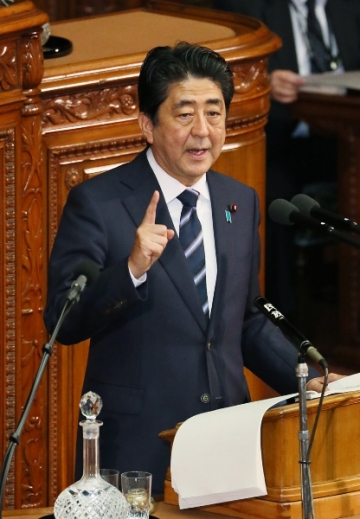
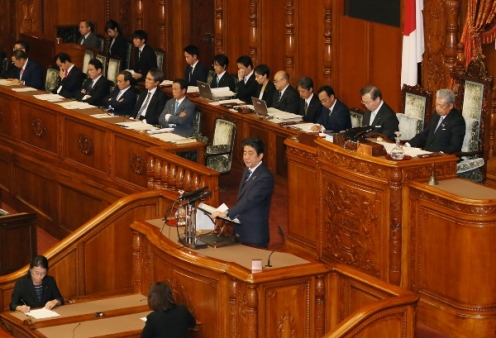

Cabinet Secretariat [Tuesday, Oct 4, 2016]
Council on National Strategic Special Zones
Prime Minister Shinzo Abe held the 24th meeting of the Council on National Strategic Special Zones at the Prime Minister's Office.
During the meeting, debate took place on certifying the special zone plan, additional items for regulatory reform related to priority fields and issues, and other matters.
Based on the discussion, the Prime Minister said,
“The participants today include Mr. Mitsuhiro Kadowaki, Mayor of Semboku City in Akita Prefecture, and other enthusiastic members of municipalities and businesses. We have received proposals on important issues being addressed by the Council on National Strategic Special Zones; the acceptance of foreign personnel in agriculture, travel programs led by the region, the broadening of the eligible age for children to attend small-scale daycares, and other issues.
These are all extremely important proposals for realizing vitalization of local economies and a society in which all citizens are dynamically engaged, both of which are being advanced by the Abe Cabinet.
We will accelerate discussions towards the realization of all these proposals. We will do so immediately for those that do not require legal revisions, while for those that do require legal revisions, I intend to submit bills to the next Diet session.
At the previous meeting of this Council, Ms. Yuriko Koike, Governor of Tokyo, put forward a proposal for a new framework to more strongly advance the Tokyo Special Zone.
Today we will launch the Tokyo Special Zone Advancement Joint Secretariat, which the Government and Tokyo will operate in collaboration. Furthermore, if municipalities that have produced results wish, I would like to launch similar frameworks for them.
By fully operating the Council on National Strategic Special Zones, and by unleashing the potential of regions throughout Japan by means of regulatory reform, I would like to catalyze the growth of the nation as a whole. Thank you.”
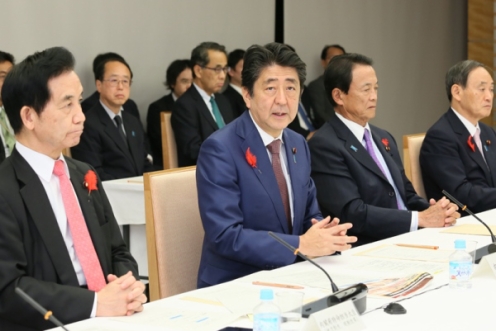
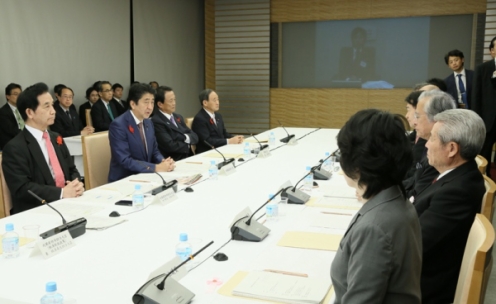
Cabinet Secretariat [Monday, Oct 3, 2016]
Congratulatory Telephone Call to Honorary Professor Yoshinori Ohsumi - Cabinet Secretariat
Prime Minister Shinzo Abe made a congratulatory telephone call to Tokyo Institute of Technology Honorary Professor Yoshinori Ohsumi, who was awarded the Nobel Prize in Physiology or Medicine.
During his congratulatory remarks, the Prime Minister said,
I want to truly congratulate you, Professor Ohsumi, for being awarded the Nobel Prize in Physiology or Medicine.
I am truly proud as a Japanese citizen that the results of your research have given hope to those suffering from difficult-to-treat diseases such as cancer and Parkinson’s disease.
I have heard that you often talk of the importance of rising to the challenge of doing things that no one else is doing. I believe that this attitude of attempting challenges is what led to your award, and that you have greatly encouraged the young researchers who are following in your footsteps.
With your award, Japanese researchers have won Nobel Prizes three years in a row. I am extremely pleased that Japan is able to lead the world through innovation in fields such as biology and medicine, and that we can contribute to the world in this way.
Please take good care of your health. I expect that you will continue to be even more active in academia globally.
Again, my sincere congratulations.”
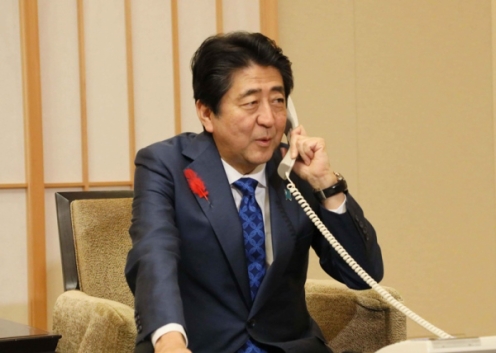
Cabinet Secretariat [Monday, Oct 3, 2016]
Nobel Prize in Physiology or Medicine for 2016: Comment by Prime Minister Shinzo Abe
Dr. Yoshinori Ohsumi, Honorary Professor at Tokyo Institute of Technology, has been awarded this year’s Nobel Prize in Physiology or Medicine.
I was truly pleased to learn that the Nobel Prize was awarded to a Japanese person, and would like to express my heartfelt respect for the achievements of Professor Ohsumi.
This award reflects the high acclaim given worldwide for the achievements related to Professor Ohsumi’s discoveries of mechanisms for autophagy.
I take great pride as a citizen of Japan in the fact that this discovery of truth, achieved through the creative ideas of a Japanese researcher, has greatly contributed to the continued development of humankind and the international community, and has been recognized by the world.
The Government of Japan aims for continued innovation in all fields. We will continue to firmly support creative and diverse research and strongly promote the training and fostering of researchers.
Cabinet Secretariat [Sunday, Oct 2, 2016]
Science and Technology in Society (STS) forum
Prime Minister Shinzo Abe attended the 13th Science and Technology in Society (STS) forum Annual Meeting held in Kyoto, where he delivered an address.
The Prime Minister said in his address:
Chairman Omi, thank you very much for inviting me again. Distinguished guests, it's a pleasure to see you all.
I have come to join you so often that I have developed a habit ...a habit of mind, to ponder, come, September as I make my way to the UN General Assembly, how science and technology can make a difference in our societies, especially in Japanese society.
And the following is what I was thinking about on my way out, and on my way back, between Japan and the U.S.
I must first correct what I have just said. Because the question is NOT about how science and technology CAN make a difference in our society. Science and technology MUST do it.
Take diabetes, for example. You need to keep an eye on how high your blood sugar is before it's too late.
And it is exactly here that technology kicks in. Suppose your wristwatch set off an alarm each and every time your blood sugar level passed a certain point. Then you could choose to walk, jog, or eat less to bring it back to normal.
Its implications, of course positive, for our budget should be enormous. After all, we're spending as much as 10 trillion yen, which is more than our education budget, just tackling the illnesses ageing causes.
I, for one, would like to have a robot micro sensor always looking over my intestines to see how far I have gotten my Crohn's disease under control, which, by the way, I have been successful in doing thanks to the medicine I take. Actually, I am in such good shape that I even became Mario.
Wireless sensing technology also helps provide a watchful eye, 24/7, to those elderly under nursing care.
The aged and frail could suit up in robot armour suits to regain muscle power.
Speaking of science, medical science will surely scale new heights by mining big data collected in real time, with sensors communicating all the time with the cloud above.
In order for this to happen, doctors must be able to gather, and then analyse, such data with your signature on it. This is challenging. How best we can strike a balance between individual privacy and cyber security on one hand and scientific advancement on the other is something we are working on. We will work it out.
Science and technology, exactly as Chairman Omi believes, always help advance our societies. My point is, ladies and gentlemen, they must do a better job NOW than ever before.
Call it "Society 5.0," where science and technology play even more key roles in tackling challenges like ageing, sluggish productivity growth and enhancing well-being of humans, and that is what my government has chosen to aim for as a long term strategy.
A long, long time ago, we were all hunters, which was "Society 1.0." We then developed an agrarian society, "Society 2.0." "Society 3.0" was industrialization. And then the information age came, which ushered in "Society 4.0."
In contrast, under "Society 5.0," technologies of sensing, robotics, communication, big data and cloud computing all merge to solve the problems previously deemed unsolvable.
I must end my remarks with my usual note, which is about the power of women.
Earlier this year I chaired the G7 Summit in Ise-Shima, Japan. There, my colleagues and I issued the "G7 Guiding Principles for Capacity Building of Women and Girls," and "WINDS," which is “Women’s Initiative in Developing STEM Career.
In retrospect, no matter the age, hardly ever has a revolution come from the centre. It tends to come, almost always, from the periphery. In our still, shall we say, largely male-dominated societies, the hope is that new ideas, innovations, and something thus far unimaginable should emerge from female brain cells.
With that in mind, my government has put forth quite a number of new initiatives.
We all know who Isaac Asimov is. The great sci-fi author was also the father of a robot.
Guess what the robot in his novel did. It was not like an Iron man demolishing evil. The robot simply gave loving care to a young girl. It was the girl's best friend.
Ladies and gentlemen that is "Back to the future." A future around the corner.
Thank you so much.
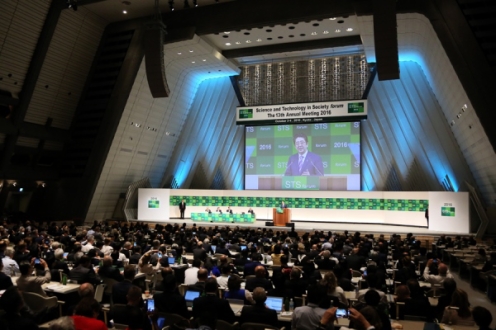
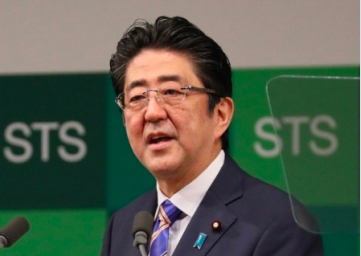
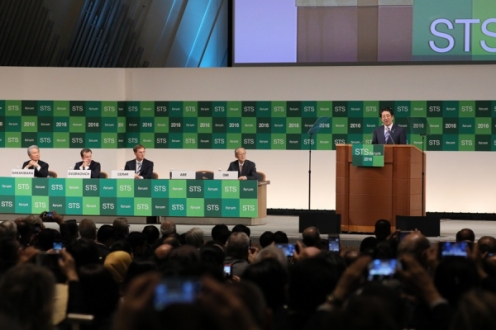
Cabinet Secretariat [Monday, Oct 3, 2016]
CEATEC JAPAN 2016 Opening Reception
Prime Minister Shinzo Abe attended the CEATEC JAPAN 2016 Opening Reception held in Tokyo.
After observing exhibits in the exhibition venue, the Prime Minister said in his address,
“I am truly grateful to have been invited to the CEATEC JAPAN 2016 Opening Reception today. I was able to come here after finishing up a seven-hour budget deliberation today. Recently, even in the Diet, I have been receiving many questions about IoT and the fourth industrial revolution.
I believe that the history of our country’s IT and electronics industries is the history of our economic growth since World War II.
A television program I cannot help but watch in the mornings ended last week. There was a nostalgic scene in the final episode that made me recall how life would become richer whenever a new kind of electronic device was released.
1964 was when the Tokyo Olympic and Paralympic Games were held, and it was the first year for CEATEC’s predecessor, the ‘Japan Electronics Show.’
In those years, I remember how exciting it felt every time a new electronics device was released, and the feeling that our homes had become much more convenient. The cityscapes of Japan, having entered Japan’s period of rapid economic growth, were at that time just on the cusp of a great change. Electronics such as the so-called ‘three holy durables’ (televisions, refrigerators, and washing machines) quickly pushed us toward becoming one of the greatest economies.
I have heard that CEATEC, which has so far supported growth in electronics, is now shifting itself away from these items and toward an exhibition that offers solutions to social problems through IoT. I have high expectations that technology, people, and information from all around the world will gather, and CEATEC will become a Mecca for this cutting-edge field.
The whole world is currently being swept up in the wave of the fourth industrial revolution. New value is being produced by making use of big data and AI and by creating connections between people and products unlike any that have been thought of before. For instance, take the current social phenomenon of Pokémon Go. This game has taught us the joy of walking to various places in the real world by fusing a game with reality. I do not play it myself, but I have heard there are even Pokémon within the Prime Minister’s Office. I do not know if anyone has caught any there though.
Some may feel that the technological capabilities and strengths that Japan has cultivated so far will not be applicable to the era of the fourth industrial revolution. I do not believe that. For instance, we have technology such as our fine-tuned control systems for accurate sensors and robots, which will both be central to the fourth industrial revolution. Or there are our strong workplaces, which work to accumulate steady improvements. Our strength is our capability to continuously improve our technology, products, and services under the stern gazes of our customers, as it is often said that the ‘customer is king.’
The fourth industrial revolution will improve the lifestyles of the Japanese people while also enhancing the productivity of Japanese companies. We will support your attempts to tackle new challenges, which are going to play a main role in that revolution. Centered on the recently established Council on Investments for the Future, we will not hesitate to implement needed reforms.
For instance, work is being done to develop 8K technology for medical uses. I saw a demonstration of this technology at the Prime Minister’s Office, and I was able to see very clearly each individual vein on the screen. With this technology, I became confident that the precision of procedures such as endoscopy will improve dramatically, reducing the burden on patients.
Japan faces the challenges of a society with an aging population and a falling birthrate. However, with your advanced technology and bold spirit of taking on challenges, I am confident that we will absolutely be able to achieve a strong economy in Japan. We will truly make those challenging circumstances into opportunities.
This May, Chancellor Merkel and I reached an agreement that Japan would be a Partner Country at CeBIT to be held in March in Hannover, Germany, next year. I have heard that a Partner Country agreement has just been concluded between Japan and Germany in light of that. There can be no doubt that collaboration between Japan and Germany, which are both competitive in the fields of “monozukuri,” or manufacturing, and IoT, is a big step toward the acquisition of global standards in these fields.
I hope to travel to Hannover in March next year when CeBIT is held. Let us all go to Hannover together. Thank you very much. I hope that those of you who applauded just now will absolutely come with me to Hannover. I also hope that we will show off Japanese technology that will astound the world, and that together with Germany, we will continue to lead the world through its fourth industrial revolution.
The IT and electronics industries are key industries for Japan which support more than 1 million jobs. Without your activities, there can be no development of the Japanese economy.
I would like to end my remarks by expressing my wishes for the continued success and activities of everyone gathered here today, as well as for the success of CEATEC.”
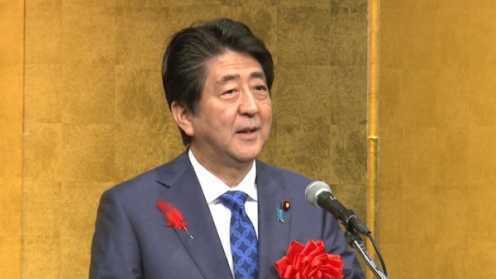
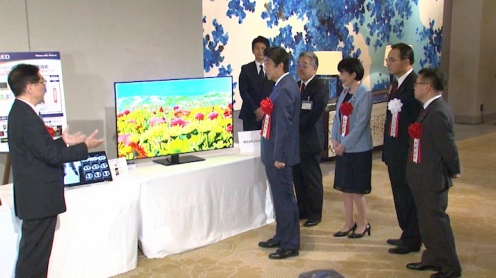
Ministry of Economy [Tuesday, Sep 27, 2016]
Energy Conservation Technology Strategy 2016 Formulated
The Agency for Natural Resources and Energy (ANRE) and the New Energy and Industrial Technology Development Organization (NEDO) jointly formulated the Energy Conservation Technology Strategy 2016. The strategy aims to effectively promote the research and development of energy conservation technologies and popularize them, and specifies the important fields that will strongly contribute to energy conservation.
1. Overview
The strategy aims to effectively advance R&D and popularize the outcomes from R&D as an effort for achieving the goal of “realization of an advanced energy-saving society” set in the Strategic Energy Plan. To this end, it specifies the technologies that Japan should emphasize, and describes compiled scenarios and other future visions for introducing such technologies into society.
In light of the Strategic Energy Plan and other government policies, ANRE, under the Ministry of Economy, Trade and Industry (METI), and NEDO collaboratively formulated the strategy, taking into consideration the Energy Conservation Technology Strategy 2011 as the basis of the revision and the discussion results from the expert meetings.
2. Key points of the revised strategy
The strategy was revised to include broader concepts concerning energy management systems, e.g., HEMS and BEMS, bearing in mind the trends in IoT and other new related technologies.
For details, see the Japanese language news release.
Ministry of Economy [Thursday, Sep 29, 2016]
ASEAN+3 Ministers on Energy Meeting (AMEM+3) and East Asia Summit Energy Ministers Meeting (EAS EMM) were Held
On September 22, 2016, the ASEAN+3 Ministers on Energy Meeting (AMEM+3) and the East Asia Summit Energy Ministers Meeting (EAS EMM) were held in Nay Pyi Taw, Myanmar. Japan offered a new proposal on future energy cooperation and participating countries welcomed the proposal. In addition, Japan held a meeting with the Minister for Electricity and Energy of Myanmar and other officials.
1. AMEM+3 and EAS EMM
These meetings were inaugurated to ensure a stable energy supply and enhance measures for energy security and addressing climate change in the Asian regions, where energy demand has been growing, providing good opportunities for energy ministers of participating countries to discuss approaches to policy harmonization and international cooperation.
The AMEM+3 was held, bringing together energy ministers from 10 ASEAN Member States and ministers and officials in charge of energy from Japan, China and the ROK. As a representative of Japan, Mr. Toshinao Nakagawa, Parliamentary Vice-Minister of Economy, Trade and Industry, attended the meeting.
Concerning the EAS EMM, officials from Australia, India, New Zealand, Russia and the United States in addition to the ASEAN+3 participating countries also attended.
At these meetings, participants mainly discussed the following subjects:
Raising common recognition among participating countries for promoting the utilisation of natural gas in Asia and future actions therefor
Promoting customized further cooperation for ASEAN’s energy efficiency and conservation based on each country’s development stage.
At the meetings, Japan offered a new proposal on promoting the utilisation of natural gas in Asia and shared the importance of three efforts with participating countries: establishing a more flexible and transparent LNG market, encouraging investment in gas-related business and infrastructures, and exploring new demand. In addition, participants agreed that Japan and EAS participating countries will start the discussion on concrete policies for advancing the EAS collaboration on natural gas with the support of the Economic Research Institute for ASEAN and East Asia (ERIA) and other related institutions.
Furthermore, Japan proposed to promote customized further cooperation for ASEAN’s energy efficiency and conservation based on each country’s development stage. Participating countries welcomed the proposal.
Concerning the EAS Mid- and Long-term Energy Policy Research Roadmap, which Japan proposed in 2015 and ERIA prepared, participating countries reached consensus on the roadmap, aiming to accelerate energy policy research contributing to the development of policies by participating countries. Based on the roadmap, ERIA will lead the efforts for enhancing energy policy research in collaboration with energy researchers of participating countries.
In addition, Japan introduced its programs for human resource development in the fields of energy efficiency, nuclear safety and establishment of oil security. Participating countries expressed appreciation for Japan’s efforts.
2. Meeting with the energy minister
Parliamentary Vice-Minister Nakagawa held a meeting with H.E. Mr. Pe Zin Tun, Minister for Electricity and Energy, Myanmar, and both sides discussed the cooperation in establishing an optimal energy-mix system in Myanmar.
